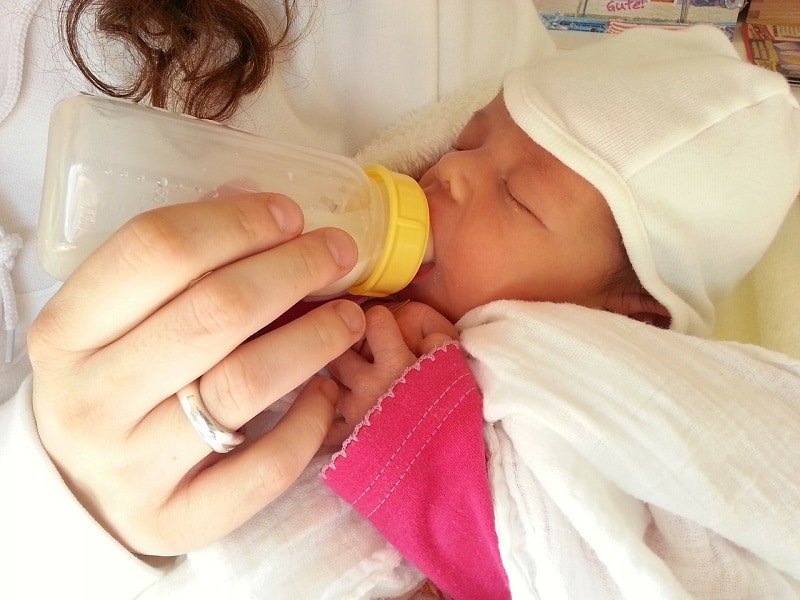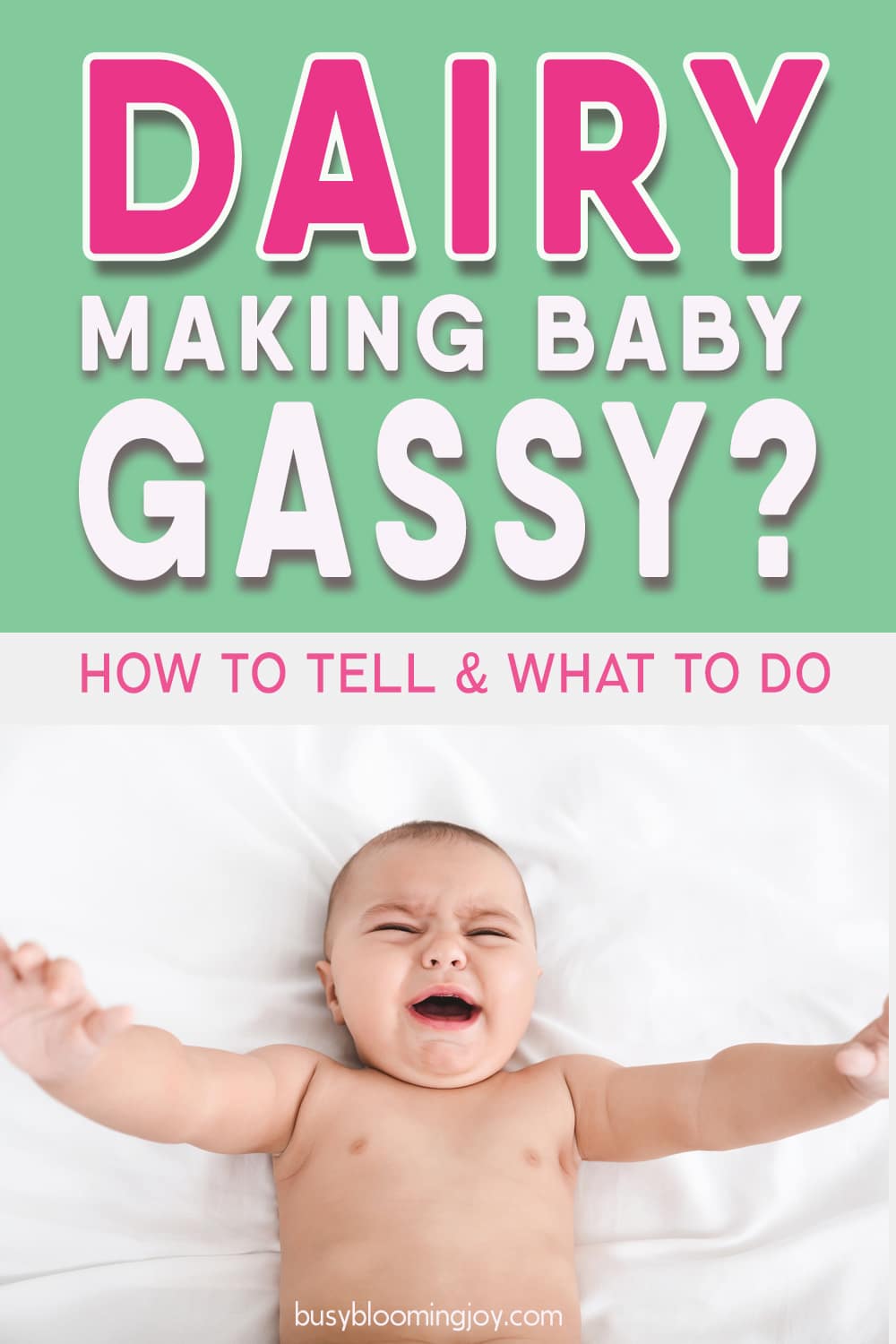There are a number of reasons why your baby is gassy. A food sensitivity might one of them.
Allergy to cow’s milk protein is not uncommon. Neither is Transient Lactase Deficiency (or lactose intolerance). Yes, they are two different things.
So if you’re feeding your baby a formula based on cows-milk and baby is screaming in pain and ‘colicky’, allergy to cow’s milk protein could be an issue.
Likewise, if you’re breastfeeding and a lover of dairy, your baby may be extra gassy due to the same allergy.
Are there any other foods that can cause gas in breastfeeding babies? Anything you should AVOID all costs when breastfeeding?
Find out all about cows milk protein allergy, transient lactase deficiency and other food sensitivities here. What to look for and how to help your baby.
Table of Contents
ToggleCows milk allergy (CMA) or cows milk protein allergy (CMPA)
Cow’s milk protein allergy is the most common childhood allergy, although the numbers themselves are low; NHS UK estimates 2-7.5% of babies under a year old are affected (source).
This is different to ‘lactose intolerance’ – that’s coming up next.
CMPA happens when baby reacts by having an inappropriate immune response to one or more of the proteins in cow’s milk. The body reacts as if fighting an infection, producing anti-bodies, which causes abdominal discomfort, pain and colicky crying.
The full list if possible CMPA Symptoms go beyond abdominal discomfort
CMPA can produce symptoms in the 3 different regions of the body: the gut, skin and respiratory tract – in most cases babies will show symptoms in 2 of these areas (source). In addition, excessive crying is common.
The full list of the most common symptoms is as follows:
ABDOMINAL
- Frequent spitting up or vomiting (reflux)
- Diarrhea
- Constipation
- Blood in stool
SKIN
- Rash
- Itchiness
- Swelling, particularly around the eyes, mouth and nose
RESPIRATORY
- Runny nose, similar to hay-fever
- Wheezing
- Cough
OTHER
- Excessive crying – diagnosed with colic according to the Rule of Threes (crying for three or more hours per day, at least three times per week, for at least 3 consecutive weeks)
In more severe cases, symptoms can include swelling inside the mouth and throat, even anaphylactic shock. (Obviously, the latter is potentially fatal and needs immediate help.)
CMPA symptoms don’t always come on immediately
In fact there are two types of CMPA:
- Immediate CMPA – Symptoms come on within minutes or up to 2 hours after ingesting
- Delayed CMPA – symptoms only start several hours to several days later
CMPA is more common in babies fed cow’s milk formula. It’s the cause of abdominal discomfort and excessive crying in about 10% of colicky formula fed babies (source).

In breastfed babies, CMPA is much more unlikely. Cows milk protein does pass from mother to baby, but at a much lower concentration than if ingested directed – levels are around 100 000 x lower (source).
So only 0.5% of breastfed babies show CMPA symptoms (source). Symptoms are the same and normally only mild (as per list above). Severe symptoms of CMPA are very rare in breastfed babies.
Most children grow out of CMPA
Good news – around half of babies grow out of CMPA by 1 year old, 60-75% by 2 years and 85%-90% by 3 years. (Source)
How to help your baby with CMPA
IN A NUTSHELL
Remove cows milk protein from baby’s diet or use an ‘EH’ or amino acid-based formula
HOW TO DO IT – FORMULA-FED BABIES
For formula-fed babies, try a hypo-allergenic and ‘extensively hydrolyzed’ or ‘EH’ formula. This means the milk proteins have already been broken down (hydrolyzed) so are less likely to initiate the painful immune response that’s troubling your baby.
There are a number of EH formulas available, including Alimentum and Nutramigen.
In severe cases of CMPA, baby may still show symptoms when fed EH formulas. In this case try an amino acid-based formula, such as SMA Alfamino.
Amino acid-based formulas have been shown to be effective at eliminating CMPA symptoms if EH fails. (Source)
DO NOT replace with soy formula. Soy protein is not hypo-allergenic and babies with CMPA may also be allergic to soy (source).
HOW TO DO IT – BREAST-FED BABIES
If you’re breastfeeding, you will need to remove all dairy products from your diet. That’s a tough one (yup, I speak from experience!)
Depending on how much you love your dairy (so how much is in your system), it may take several weeks for all the cow’s milk protein to leave your body. Then another week or so to exit your baby’s.
If your baby is crying less and showing less signs of visible discomfort CMPA would well be the problem. You could test this by adding dairy back into your diet (or you may not want to risk it!)

TIPS FOR SUCCESS
If your baby has CMPA and you’ve managed to keep symptoms to the minimum or erradiact them through a chance in your diet/their formula, watch out when you start on solids.
Your baby will likely react to all sorts of lovely baby-friendly food like yogurt, cheese, bechamel sauces etc… (Again, I speak from experience!) Keep a food diary to monitor this closely.
Cooking dairy products can reduce symptoms (cheese sauce rather than sticks of cheese) but if your baby is easily upset it’s probably best to avoid dairy altogether. Try feeding your baby dairy once every month or so (depending on how brave you are) to see if the CMPA has subsided.
(My daughter was still showing symptoms when eating food cooked in a white sauce at 8 months, but at 9 months was loving it. She continues to be a big cheese lover.)
Transient Lactase Deficiency (lactose intolerance)
This is often termed ‘lactose intolerance’ but true lactose intolerance in babies is incredibly rare.
Lactose is a sugar found only in milk and the main source of carbohydrate for babies (important for energy and brain development). So being able to digest lactose is pretty important.
Undigested lactose not only means baby is missing this important nutrient: the sugar ferments creating lactic acid and hydrogen gas and… you guessed it, causes abdominal discomfort.
CONGENITAL LACTOSE INTOLERANCE
A tiny percentage of babies are born with true lactose intolerance, termed ‘congenital’ lactose intolerance since it’s inherited. Symptoms are extreme and life-threatening (persistent diarrhea, vomiting, dehydration and failure to thrive) and often only resolved by lactose-free formula.
PRIMARY LACTOSE INTOLERANCE
Adults can develop lactose intolerance, called ‘primary’ lactose intolerance, and this is relatively common. This is caused by a reduction in the production of lactase, the enzyme that breaks down lactose, with age. But it normally starts later in life and never before the age of 2.
TRANSIENT LACTASE DEFICIENCY
However, what is thought to be relatively common in newborns is a deficiency in lactase, ie not enough is being produced to break down all the lactose. This is a reflection of an immature digestive system and is more common in premature babies. This is known as ‘transient lactase deficiency’.
As baby matures, the production of lactose increases and the situation resolves itself.
Transient lactase deficiency can also occur after a severe infection (eg gastroenteritis) or a food allergy which temporarily damages the gut. This damage inhibits the production of lactase.
So severe cows milk allergy could also cause temporary lactose intolerance. Otherwise, the two are not related (other than the fact that both milk protein and lactose are found in milk!)
Symptoms of transient lactase deficiency
Symptoms are restricted only to the gut. Gas from fermented lactose causes pain, flatulence and the other bi-product of fermentation, lactic acid, causes diarrhea.
How to help your baby with Transient Lactase Deficiency
IN A NUTSHELL
Try Lactase
(Lactose-free formula is only necessary in the extremely rare congenital lactose intolerance. These formulas are nutritionally inadequate so use needs to be supported by professional nutritional advice.)
What may help is the addition of lactase drops, specifically formulated for babies. This supplements babies limited lactase supply, aiding digestion of lactose and has been shown to reduce crying times in colicky babies. (Source)
HOW TO DO IT
Order some Lactase! Such as Colief Infant Drops. It’s expensive, I wish I’d tried it.
TIPS FOR SUCCESS
If you really believe your baby has transient lactase deficiency (or even if you’re not really sure), put your hand in your pocket and give it a try! If it doesn’t work you know that transient lactase deficiency is NOT an issue.
I didn’t and am now convinced that that was part of my daughters’ issue. Instead, I bought Infacol (Simethicone) which did nothing (as per evidence from numerous studies). And my daughter was also prescribed an antacid, which she may not have needed.
Other food allergies
Allergies or sensitivities to other foods work in exactly the same way as allergy to cow’s milk protein. Baby produces an immune response to proteins present in certain foods that are passed to them through breastmilk.
Symptoms are also similar to CMPA, relating to the gut, skin and respiratory tract with more severe symptoms potentially life-threatening (eg anaphylactic shock).
The severity of symptoms depends on how much you ate of the problem food and how sensitive baby is to that food.
Common food sensitivities
Unfortunately, there is no list of foods that breastfeeding mothers should avoid – sensitivities will be unique to your baby. But it seems some are a lot more likely than others.
As well as, cows milk protein, reactions to egg, soy, wheat, corn and peanuts have been documented to cause an allergic/immune response in babies.
Unfortunately, babies who suffer from cow’s milk protein allergy are more likely to suffer another food sensitivity (source).
There is no evidence (so far) of other foods causing digestive discomfort or colicky crying. Having said that, lots of moms swear that certain foods increased gassiness in their babies and saw an improvement after removing those foods.
You may suspect other foods if:
- There’s family history of food allergies
- Something you ate a lot of was shortly followed by colicky symptoms in your baby
- Something you’ve never eaten before causes colicky symptoms in your baby for the first time
- A food that makes you uncomfortable (the allergens that cause discomfort in your gut might pass to your baby and cause them to be uncomfortable – ie if you eat bread and you’re gluten intolerant)
I, for one, was sure that a spicy curry was the reason for my first-borns excessive crying the next day. But this could well have been a coincidence. I never ate curry again while I was breastfeeding him to be able to test the theory – the risk wasn’t really worth it to me. Now that I’ve read more into this (see below) it seems unlikely that the curry caused that colicky episode.
Just like CMPA, children normally grow out of these food sensitivities
That only one that is often not outgrown is also the most dangerous one (due to the severity of the symptoms): peanut allergy. Once dedicated in infancy is normally there for life.
On that note, in order to avoid peanut allergy, the thought now is to try and introduce it earlier, rather than later. Check with your pediatrician for more details or read this recent guideline released by the American Academy of Pediatrics.
Common misconceptions regarding food eaten by breastfeeding moms
This study investigated self-food restriction in 145 breastfeeding mothers. Most commonly restricted foods were caffeine, spicy foods, raw foods, cold foods and Sikhye (a traditional Korean rice beverage).
The conclusion was that:
“Most mothers restricted certain foods unnecessarily. …there are no foods that mothers should absolutely avoid during breastfeeding unless the infant reacts negatively to the food.”
This study, among others, answers some common questions when it comes to the diet of a breastfeeding mom. Basically, there are a lot of misconceptions.
QUESTION: Can you have caffeine if you’re breastfeeding?
The transfer of caffeine consumed by breastfeeding mothers is minimal, at less than 1%. If you consume in excess of 5 cups of coffee, caffeine might start to accumulate.
Colicky behavior attributed to caffeine has only been recorded by breastfeeding mothers drinking 10+ cups of coffee. Given that caffeine is present in tea, soft drinks and chocolate as well you might go overboard on caffeine if you consume these in excess, but it’s unlikely.
ANSWER: Yes
(Just don’t go mad – in any case too much caffeine will make you a little crazy)
QUESTION: Do spicy foods cause colic, gas, diarrhea, and rashes in breastfed babies?
Strong flavors do get passed into breastmilk, changing the smell and flavor. But there’s no evidence of increased colicky behavior and gas. In fact this study found that babies apparently liked the garlic flavor of their mothers milk and nursed for longer.
ANSWER: No

QUESTION: Do gassy foods (that make you gassy eg cabbage, cauliflower, broccoli, beans and pulses etc) make baby gassy?
These foods can cause the mother to be gassy. But gas in the mother’s gut is not transferred to her blood, so cannot be passed into breastmilk (source)
ANSWER: No
QUESTION: Can acidic foods make your breastmilk sour and cause colic or reflux symptoms?
Similarly, the acidy of citrus fruits, tomatoes etc does not affect the acidity of breastmilk.
ANSWER: No
How to help your baby if you suspect a food allergy
IN A NUTSHELL
Stop eating suspected foods
HOW TO DO IT
Assuming you’ve already tried eliminating dairy, the most common allergy in babies as per #2, the next step is to stop eating egg, soy, wheat, corn and peanuts, the next most likely culprits.
Symptoms should improve within a week, but it can depend how much of the particular food you were eating and the food itself. So, it could take a few weeks.
Wait at least 2-3 weeks.
Like with CMPA, if your baby is crying less and showing less signs of visible discomfort it’s likely that one of those foods is a problem. Then you can start adding them back in one by one to find out exactly which one your baby is sensitive to.
TIPS FOR SUCCESS
Keep a food journal so you can easily keep track of what you’re eating when and include any colicky crying/abdominal behavior you see in your baby.
Check the labels of every food packed – soy in particular is found EVERYWHERE. I speak from the experience of a close friend whose baby was allergic to cow’s milk protein and soy. She found food shopping a nightmare!
If you believe other foods may be responsible or want to try eliminating a broader range of foods, Ask Dr Sears has a very in-depth elimination diet that might be worth trying. (Hint, be prepared to eat a very plain diet to start off….)
In Summary
Hopefully, this has shed a bit of light on a food sensitivity your baby may have and what to do about it.
To recap: if it’s cow’s milk protein allergy, symptoms are likely to include some kind of skin or respiratory reaction, as well as excess gas and abdominal pain.
If so, try removing dairy from your diet or switch baby to an ‘EH’ or amino acid-based formula.
If you believe Transient Lactase Intolerance to be an issue, try some infant-formulated Lactase drops.
Finally, other foods may be causing gas if you’re breastfeeding. An elimination diet may be the way to go.
Good luck and please let me know how you get on!













